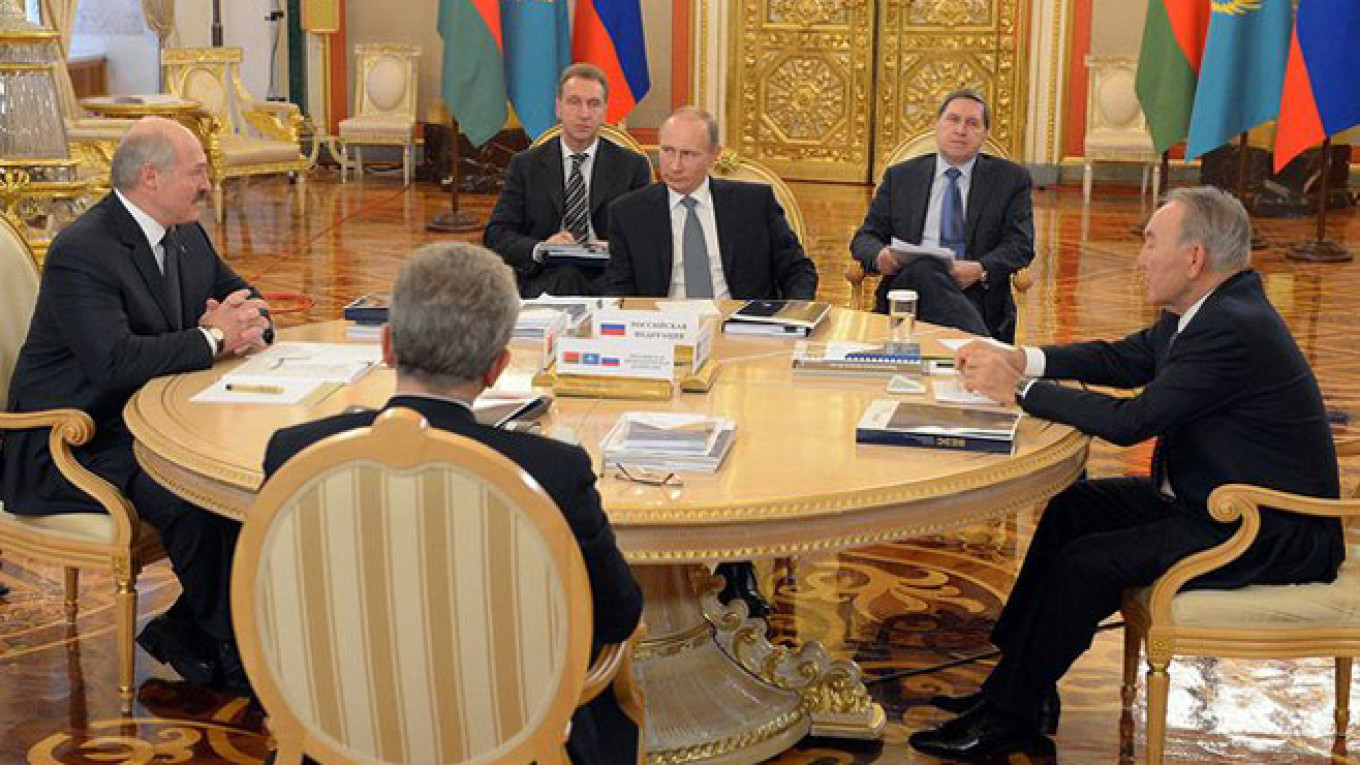Even as Russia seeks to deepen and expand trade alliances in the face of economic isolation from the West, the unilateral trade restrictions that Moscow unleashed last week show just how far its Customs Union is from a genuine economic alliance, analysts said.
Russia last Thursday unilaterally banned deliveries of meat, poultry, fish, cheese, milk and dairy products from the European Union, the United States, Australia, Canada and Norway in retribution? for the countries' sanctions against Russia over its policy in Ukraine.
But Belarus and Kazakhstan, Russia's partners in the Customs Union and its common economic space, have laid down no restrictions on imports from Europe — and do not seem to see any contradiction.
Following the ban, Belarussian President Alexander Lukashenko said his country can continue to buy European fruit and delicacies for the domestic market as before. A spokesman for Kazakh President Nursultan Nazarbayev said the ban was Russia's unilateral decision and not meant to involve other members of the Customs Union.
Technically, the food ban does not violate any of the union's rules. But while Russia's partners may not mind this drastic departure from a united economic line, the food bans undermine the very concept of a united customs zone, according to Alexander Knobel, head of the international trade laboratory at the Gaidar Institute.
"The idea behind the Customs Union is that there should be one agency that regulates these issues, as is done in the EU," Knobel said.
Despite numerous disagreements, the European Union has moved as one in its sanctions against Russia over the crisis in Ukraine. As for Russia's food bans, the 28-state bloc is already in discussions on how to soften the impact for the countries most affected.
But even as the duress of international politics show that the Russia-led Customs Union lives more on paper than in reality, Moscow is luring more states into the zone and its planned successor, the Eurasian Union, with gas deals and wads of cash.
On Monday, Kyrgyz President Almazbek Atambayev confirmed his country's intention to join the Customs Union by the end of this year — earlier than had been expected — following a meeting with Russian President Vladimir Putin. Russia earlier promised Kyrgyzstan $1.2 billion in return for its agreement to join the union.
Meanwhile, Russian Foreign Minister Sergei Lavrov said Monday that $500 million will be transferred to Kyrgyzstan to develop its economy in return for agreeing to join the more intensively integrated Eurasian Union, which Russia is developing with Customs Union members Belarus and Kazakhstan.
Built on the three countries' previous economic agreements, the European Union envisages the gradual integration of the former Soviet countries' economies, including free trade, unhindered financial interaction and open labor migration.
Armenia, which was expected to join the union in July but has not yet reached a final agreement on the terms, is also receiving substantial incentives from Russia. Armenia's gas duty was canceled in the beginning of this year, reducing the price it had to pay for fuel by 30 percent.
But adding more members alone will not give the Customs Union more bite, nor does the current situation offer much hope for a united economic front under the Eurasian Union.
"The more the reality drifts away from this concept, the less likely it is that the idea behind the Customs Union will finally be realized," Knobel said.
Even as its long-term objectives come into the question, the Customs Union is facing an immediate threat from Russia's food bans: Belarus and Kazakhstan could potentially profit off the restrictions by re-exporting banned products onto Russian territory.
Such activity would "threaten the future of the Customs Union," and Belarus and Kazakhstan are bound to know it, said Julian Cooper, professor at the Centre for Russian and East European Studies at University of Birmingham.
"There will be no problem identifying the origin of most packaged food products, but difficulties could arise with some more general goods like rice and flour, where tracing the country of origin is clearly more difficult," he said.
Belarus and Kazakhstan are likely to stave off such re-exporting to avoid the consequences for the union, Cooper added.
This week, Lukashenko said that he would support Moscow's import bans by clamping down on the transit of banned goods, following a telephone conversation with Putin.
Contact the author at a.panin@imedia.ru
A Message from The Moscow Times:
Dear readers,
We are facing unprecedented challenges. Russia's Prosecutor General's Office has designated The Moscow Times as an "undesirable" organization, criminalizing our work and putting our staff at risk of prosecution. This follows our earlier unjust labeling as a "foreign agent."
These actions are direct attempts to silence independent journalism in Russia. The authorities claim our work "discredits the decisions of the Russian leadership." We see things differently: we strive to provide accurate, unbiased reporting on Russia.
We, the journalists of The Moscow Times, refuse to be silenced. But to continue our work, we need your help.
Your support, no matter how small, makes a world of difference. If you can, please support us monthly starting from just $2. It's quick to set up, and every contribution makes a significant impact.
By supporting The Moscow Times, you're defending open, independent journalism in the face of repression. Thank you for standing with us.
Remind me later.


